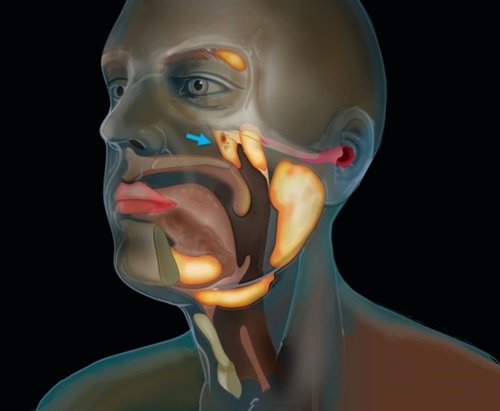- There's a part of the human body that has gone unnoticed by doctors for centuries
- According to researchers, it is a set of salivary glands
- This revelation may be greatly beneficial in minimising side effects of cancer treatment
Scientists in the Netherlands have identified an overlooked organ set deep in the upper part of the human throat: a set of salivary glands.
According to the medical researchers, from the Netherlands Cancer Institute (NKI) and their colleagues from Amsterdam UMC, UMCG and UMC Utrecht, the glands are hidden away where the nasal cavity and the throat meet.
Their findings were published in Radiotherapy and Oncology and are potentially great news for patients with head and neck tumours, a news release by NKI stated, as radiation oncologists may now be able to circumvent this area to avoid potential side effects of treatment.
Discovery entirely by chance
The discovery was entirely accidental and happened when radiation oncologist, Wouter Vogel, and oral and maxillofacial surgeon, Matthijs Valstar, were studying a new type of scan as part of their research.
They unexpectedly found two areas had lit up all the way in the back of the nasopharynx (behind the nose). These areas, they said, looked similar to known major salivary glands, although it was strange to imagine they could be located there.
"People have three sets of large salivary glands, but not there," Vogel explained. "As far as we knew, the only salivary or mucous glands in the nasopharynx are microscopically small, and up to 1 000 are evenly spread out throughout the mucosa.
“So, imagine our surprise when we found these."
Vogel and Valstar, who investigated the side effects that radiation can have on the head and neck, were using a combination of CT scans and positron emission tomography (PET) scans called PSMA PET-CT to study prostate cancer when they came across the previously unknown set of glands.
They highlighted these salivary glands with a marker and have named them the “tubarial salivary glands” due to their location over a piece of cartilage known as the torus tubarius.
The glands are about 3.9 centimetres in length, they indicated.
Of course, the research team needed to confirm their breakthrough. To do this, they imaged 100 patients (99 of them men due to the focus on prostate cancer) and found that all of them had these newly discovered glands.
This was further confirmed when they dissected that nasopharynx region from two cadavers from a human body donation programme.
Great news for patients in cancer treatment
The glands likely function to lubricate and moisten the upper throat behind the nose and mouth, the researchers wrote, and explained that in patients with head and neck cancer, including tumours in the throat or tongue, radiation therapy can damage their salivary glands and cause complications.
Patients may then have trouble eating, swallowing, or speaking, which can be a real burden,” said Vogel.
Since these "new" glands were previously unknown, no effort was made to avoid radiation in this region, which may possibly go hand in hand with these complications, they said.
The researchers, therefore, went on to examine data from more than 700 cancer patients who had undergone radiation treatment, and found that the more radiation the patients had received in the area of these glands, the more side effects they reported from their treatment.
The finding is therefore positive news, in that it could translate to fewer side effects for cancer patients.
“For most patients, it should technically be possible to avoid delivering radiation to this newly discovered location of the salivary gland system in the same way we try to spare known glands," Vogel commented.
"Our next step is to find out how we can best spare these new glands and in which patients. If we can do this, patients may experience fewer side effects, which will benefit their overall quality of life after treatment."
READ | Scientists discover possible new organ which could be the body's largest
INFOGRAPHIC | The forgotten cancers you should know about
READ | Scientists discover a new organ in the digestive system
Image: Getty/Science Photo Library




 Publications
Publications
 Partners
Partners












